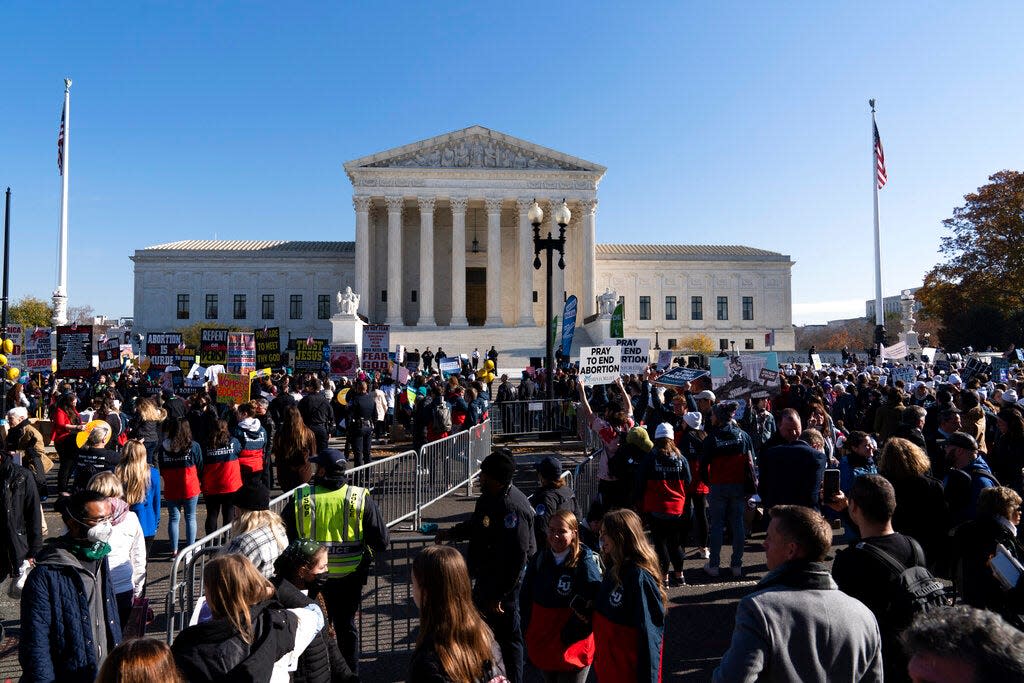Viewpoint: Judaism is both pro-life and pro-choice

The recent decision by the Supreme Court to overturn Roe v. Wade and take away the constitutional right for abortion has led to a fierce debate over the question of right to life. Most Jews believe that the decision to undergo an abortion is one that should be made by a woman, her partner if involved, and/or her medical professional.
As more states, including our own, outlaw and criminalize abortion, Jewish women and their partners may not be able to continue to freely practice their Judaism.
In cases where abortion is permitted, because there are so many potential scenarios, it is extremely difficult to legislate at what point the mother's life becomes endangered, as the outrageous case of Todd Rokita’s investigation into Dr. Caitlin Bernard’s medically appropriate care of a 10-year-old rape victim serves to demonstrate.
According to Jewish law, it takes 40 days from the time of conception until we can call the fertilized egg a fetus. Until then, Jewish sources refer to the fertilized egg as mayim b’alma (plain water). Jewish law is more lenient in permitting an abortion prior to that time. The Torah (referred to by some as the Five Books of Moses), in the book of Exodus, clarifies the difference in status of a fetus and a woman in the case of miscarriage by a violent act, in which the perpetrator pays a fine and is not punished with the death penalty, the punishment for killing a human being.
Another very important concept in Jewish law is that of pikuach nefesh ― the saving of a life. When it comes to the matter of abortion, Jewish law is very clear that the life of the mother, a fully alive person, takes precedence over the life of a fetus, a potential living being. In a case where a pregnancy is endangering a mother’s life, the fetus can be aborted even until the very last moments of the pregnancy, a late-term abortion. However, once the crown of the fetus’ head passes through the birth canal, it acquires the status of a full human being and neither life is more valuable than the other.
Every stream of Judaism permits abortion under some circumstances. The traditional Orthodox Union released a statement that said, “We cannot support absolute bans on abortion — at any time point in a pregnancy — that would not allow access to abortion in lifesaving situations. Similarly, we cannot support legislation that does not limit abortion to situations in which medical (including mental health) professionals affirm that carrying the pregnancy to term poses real risk to the life of the mother.”
Judaism is both pro-life and pro-choice. Where a choice needs to be made, the saving of the life of the mother takes precedence over the potential life of the fetus.
Judaism is pro-life in that it is concerned about what happens to babies and children after they are actually born and also to the mothers of the children who have borne them. How pro-life is an agenda that stops at the birth canal? How pro-life is Indiana when it ranks as one of the worst states in the nation with regards to maternal mortality? How pro-life is Indiana when it does not afford universal health care to all of its citizens? How pro-life is Indiana when it does not provide universal day care and kindergarten to its youngest citizens so that their mothers do not have choose between working and providing care to their children. How pro-life is Indiana when it does not provide family leave so that when a baby or child becomes sick, one of their parents can be at home to care for them? And finally, how pro-life is Indiana when high-quality public education is not provided to all of its precious youngsters?
Our lawmakers have decided to limit the human rights of women in our state by restricting access to abortion to only a small number of cases, claiming that their decision is motivated by the right to life of the fetus. But life should not culminate with birth.
Rabbi Karen Companez serves Temple Beth-El, South Bend, a Reform Jewish congregation. Rabbi Michael Friedland serves Sinai Synagogue, South Bend, a Conservative Jewish congregation.
This article originally appeared on South Bend Tribune: Outlawing abortion may complicate Jewish women practicing Judaism

